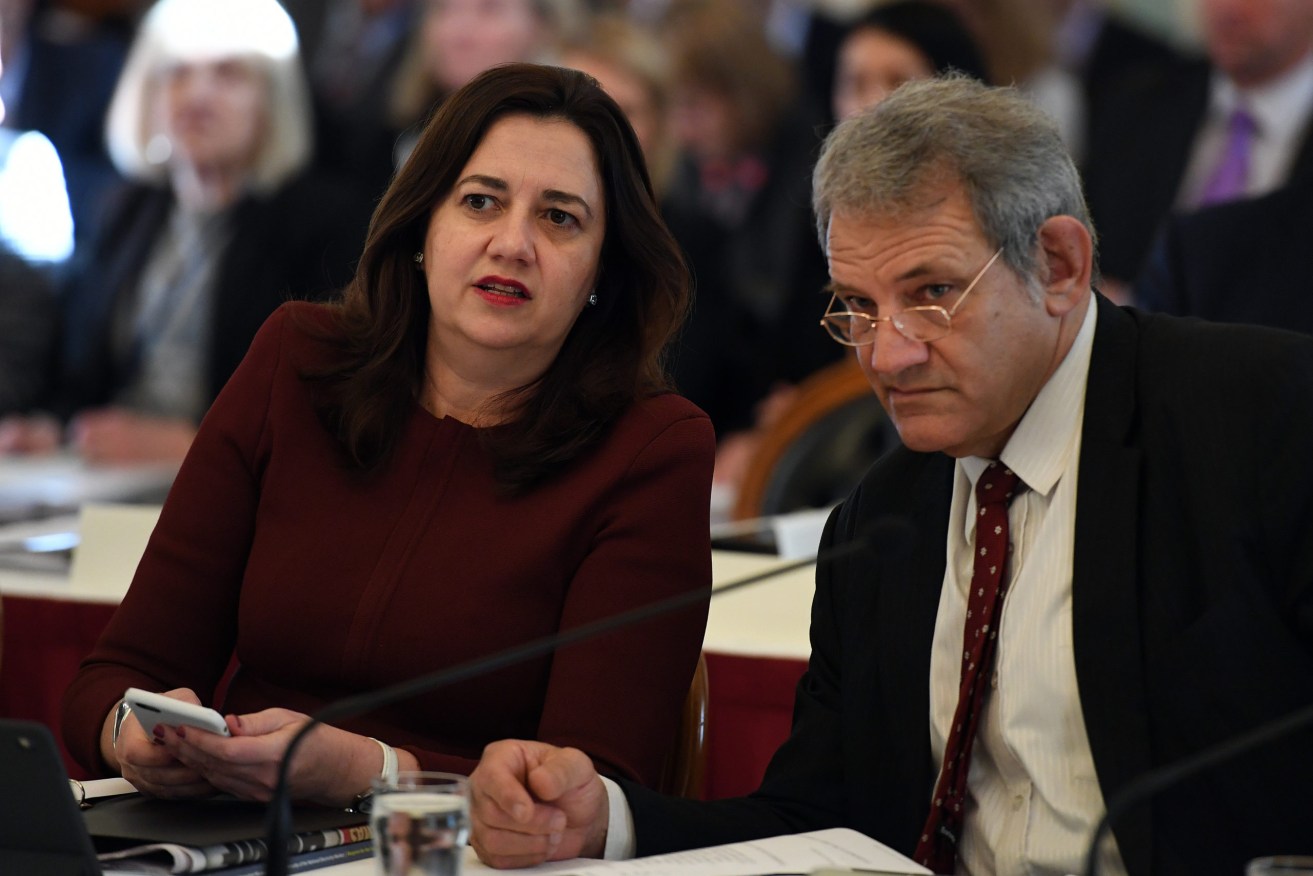Just looking guilty is enough to draw the ire of the Crime and Corruption Commission
Queensland’s anti-corruption agency might have cleared Premier Annastacia Palaszczuk’s ex-chief of staff of corruption allegations but that didn’t stop them turning David Barbagallo into an object lesson for others, writes Robert MacDonald


Queensland Premier Annastacia Palaszczuk (left) with her then Chief-of-Staff David Barbagallo in 2017. (Photo: AAP Image/Dan Peled)
The biggest question raised by the Crime and Corruption Commission’s report into corruption allegations against Premier Annastacia Palaszczuk’s former chief of staff, David Barbagallo, is why was it published in the first place?
The commission spent close to a year and an unknown amount of money investigating allegations that Barbagallo misused his position to obtain $267,500 from the Advance Queensland Business Development (AQBD) Fund for Fortress Capstone, a company he part-owned and chaired.
It found no evidence of corruption.
To quote from the report:
“The investigation did not find any evidence that the decision by the AQBD Fund to award co-investment funding to Fortress Capstone was the result of any improper influence by Barbagallo or any other individual.
“In fact, the evidence is there was no improper influence.”
Case closed you might think.
But no. Barbagallo didn’t act improperly but, according to the CCC, there was “the perception” he might have.
“Whilst the reality is that there was no improper influence, the perception, given the potential influence Barbagallo had as the Premier’s Chief of Staff, was quite the contrary,” the CCC report said.”
And you’d have to say that, on the face of it, a company part-owned by the premier’s most senior adviser receiving a quarter-of-a-million dollars from a government fund doesn’t exactly pass the pub test with flying colours.
But the CCC’s concern was more technical than that.
Among other things, Barbagallo didn’t fully fill out his declaration of interest paperwork – which ministerial staff members must complete to identify potential conflicts of interest.
Although he did declare he was a shareholder in Fortress Capstone and received income from director’s fees, he didn’t actually tell the Premier he was a director or the chairman of the company.
That mightn’t sound the most serious of oversights, but the rules are the rules and worth highlighting, according to the CCC.
Educating public servants about corruption risks is part of the CCC’s job description and as commission chairman Alan MacSporran, QC, told the Parliamentary Crime and Corruption Committee earlier this year:
“Part of that function necessarily from time to time will involve bringing to light, exposing, for public gaze corruption risks, if not corrupt conduct.”
And so, on Thursday last week, the CCC released its 55-page report on its inquiry into Barbagallo – Investigation Keller.
Barbagallo had suddenly gone from powerful public official accused of behaving improperly to innocent object lesson and teaching opportunity.
“Of particular interest to elected officials and ministerial staff, and senior public servants, the report highlights how conflicts of interests, if not properly managed, can create public perceptions of impropriety,” the CCC said.
Seizing a real-world example to educate public servants is all well and good but the thought that struck me as I read through the report was, “Yes, but at what cost to the individuals involved?”
As a journalist, I’m all in favour of government agencies releasing as much information as possible about their activities.
It makes a refreshing change to the usually tortuous efforts to hide behind spin or black-letter interpretations of Right to Information laws.
But in this case, and more generally, at what point does the CCC let its targets off the hook?
The CCC receives an allegation of potential high-level corruption, which it investigates and finds to be unsubstantiated.
But instead of closing the books, the CCC decides, “in the public interest”, to produce a report, which according to Barbagallo’s lawyers, “involves an obvious effort on the part of the commission to find something (anything) against Mr Barbagallo, resulting in exaggerated and unfair conclusions against him.”
This isn’t to defend Barbagallo. I worked with him some years ago in the office of then-premier Wayne Goss and know he’s perfectly capable of defending himself.
In any case, the CCC’s report includes a 10-page response to the CCC’s claims by Barbagallo’s lawyers, including the quote above.
There’s also the broader question of whether this is the best use of the CCC’s resources.
The CCC’s annual report for 2019-20 reveals the commission finalised only 51 per cent of corruption investigations, against a target of 85 per cent.
MacSporran told the Parliamentary Crime and Corruption Committee earlier this month this was partly because ”investigations into corrupt conduct continue to be protracted and complex in nature and require specialist resources which are shared across multiple investigations.”
It’s worth debating whether it’s more productive to use the resources you do have to finalise investigations in a timely way, or write educative reports for the edification of the public service.
Whatever the answer, there’s one clear message from the CCC for public servants – do your paperwork.












